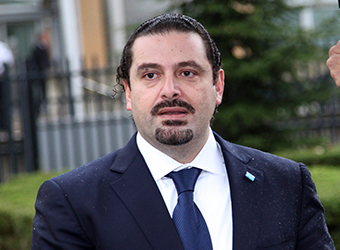Nothing so encapsulated the political shackles in which Saad al-Hariri has operated as Lebanon’s prime minister as the way he resigned in a televised statement made from Saudi Arabia.
Every major decision by the unlikely politician was determined by factors beyond his control. He entered politics after the 2005 assassination of his father and his resignation served the agenda of Riyadh.
The dependence of their leaders on powerful external patrons is nothing new in Lebanon, where regional powers from Saudi Arabia to Iran have long tussled for geopolitical advantage.
But the case of Hariri, who many Lebanese think was summoned to the Saudi capital, coerced into resigning and put under house arrest- which he has denied- underscores an instance of external pressure extreme even by Lebanon’s high standards.
In an interview on Sunday, he said he will return to Lebanon in the coming days and might reconsider his resignation. Even if he does, the events of the past 10 days show how decisions taken beyond Lebanon’s borders would still define his role.
His shock resignation statement on November 4, which has thrust Lebanon into a new political crisis, included a laundry list of Saudi complaints about the behavior of Iran and its Lebanese ally Hezbollah, Riyadh’s main political adversaries.
Iran and Hezbollah, Hariri said, are “sowing strife” in the Arab world.
As Riyadh’s ally at a time of its enemies’ ascendancy, Hariri was already playing Lebanon’s intricate political game from a position of weakness. A year ago, after spending years abroad, he agreed to join a national unity government with President Michel Aoun, a former rival and Hezbollah ally, that included Hezbollah itself.
A year ago, after spending years abroad, he agreed to join a national unity government with President Michel Aoun, a former rival and Hezbollah ally, that included Hezbollah itself.
It was a compromise he said was necessary to end Lebanon’s sectarian-tinged political paralysis and one that was personally difficult, as Hariri accuses Hezbollah of the assassination of his father, Rafik al-Hariri.
He seemed committed to that compromise until the moment he flew to Riyadh on November 3, telling officials of discussions planned for his return the following Monday.
Saudi Arabia had previously accepted Hariri’s political bargain in Lebanon. But Iran’s trumpeting of its successes along with Hezbollah in the wars in Syria and Yemen at the expense of Saudi allies may have altered Riyadh’s calculation.
A day after traveling to Riyadh, Hariri appeared on television reading a statement of resignation.
Hariri’s career was built on the backing of Gulf states, the deployment of his family fortune – spending large amounts of it in Lebanon to finance a media network and charitable gifts to secure widespread support – and feelings of respect among many Lebanese for his late father.
In his resignation address, Saad said: “We are living in a climate similar to the atmosphere that prevailed before the assassination of Rafik al-Hariri”.
In Lebanon’s sectarian system, the prime minister must always be a Sunni Muslim and Rafik made his family pre-eminent among Lebanese Sunnis.
Rafik carved out a business empire in Saudi Arabia with the backing of its ruling family and returned to Lebanon to rebuild when the civil war there ended in 1990, serving twice as prime minister. The car bomb that killed Rafik gave Saad little choice but to adopt a previously unsought role as political leader.
Before being plunged into Lebanon’s volatile politics, Saad had led a playboy lifestyle running his father’s business. He was raised in Saudi Arabia and has Saudi nationality.
Outrage at Rafik’s killing helped Hariri’s movement to electoral victory five months later and he installed a political ally as prime minister, not taking the post himself until 2009.
It was the first government headed by factions opposed to the influence of Syria – and by extension Damascus’ allies Iran and Hezbollah – since the 1975-90 Lebanese civil war.
That opposition came to a head in 2008 when the government tried to seize Hezbollah’s telecommunications network, triggering street battles in Beirut that the heavily armed Shi‘ite Muslim movement won.
Qatar brokered a compromise, with Hariri becoming head of a coalition government that included Hezbollah. But Hezbollah pulled out in 2011, bringing down the administration.
As tensions rose over the war in neighboring Syria, Hariri left Lebanon, spending most of the ensuing years abroad until he returned months before joining a new government last year.
But his sway – and that of his family’s regional patron Saudi Arabia – had diminished. The formation of last year’s government was widely seen in Lebanon as an acknowledgement of the political dominance of Iran and Hezbollah.
Saudi Arabia’s own apparent impatience with Hariri became evident in the fortunes of the family company – Saudi Oger – whose billions had underpinned their political role in Lebanon.
With a new dispensation in Riyadh under King Salman and his ambitious son Prince Mohammed, and a fall in oil prices damaging its finances, the Saudi government seemed less willing to roll out big state projects to enrich some allies.
When Hariri’s first stint as premier ended in 2011, he said in a newspaper interview: “In Lebanon it’s never over for anyone”.
A source in his camp said a compromise to bring him back to Beirut as prime minister was still possible if Aoun distanced himself from Hezbollah’s regional role.
Such a statement by Aoun might give some satisfaction to Saudi Arabia, but it would seem to leave Hariri no stronger than before.
After so public a departure, especially one delivered from abroad, his dependence on Riyadh has been made especially visible. His enemies in Lebanon even mocked his Arabic during his resignation speech as being more Saudi than Lebanese.
And the posters of him that have appeared across Beirut with the slogan “We are with you” looked less like statements of mass support than solidarity with a political hostage.
Source: Reuters


